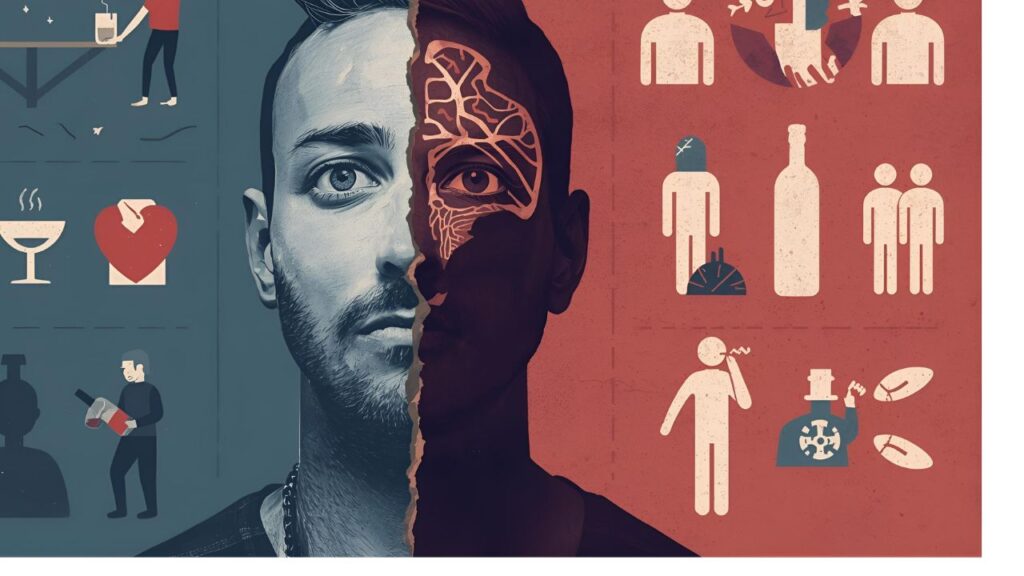Questions Answered in This Article:
- What Is Alcohol Use Disorder and Who Does It Affect
- How Does Alcohol Abuse Affect Mental Health
- What Happens During Alcohol Withdrawal
- How to Detox from Alcohol Abuse Safely
Alcohol abuse facts show how widespread this problem is across the United States, affecting millions of people each year. Drinking alcohol in large amounts leads to serious health issues, damages relationships with family members, and creates long-term challenges with mental health. Recognizing these alcohol abuse facts is the first step toward making positive changes and finding the right support.
Alcohol dependency often develops slowly, starting with alcohol misuse and growing into a substance use disorder that impacts every part of life. Heavy drinking and craving alcohol increase the risks of withdrawal symptoms when someone tries to stop drinking. At Rock View Recovery, individuals receive professional care to safely manage detox and begin building a healthier future.
What Is Alcohol Use Disorder and Who Does It Affect
Alcohol use disorder is a serious condition that develops when alcohol misuse becomes a pattern and leads to alcohol dependency. Drinking alcohol in large amounts increases the risk of accidents, liver disease, heart problems, and ongoing mental health struggles. These substance abuse alcohol facts highlight how harmful heavy drinking can be when it is left untreated.
Alcohol and drug misuse often occur together, making the effects even more dangerous for both individuals and family members. According to the National Institute on Alcohol Abuse and Alcoholism (NIAAA), about 29.5 million people in the United States live with alcohol use disorder. Early awareness and professional treatment are key steps in breaking the cycle of alcohol dependency and building a healthier future.
Signs of Alcohol Abuse and Dependency
Alcohol abuse develops gradually, and the warning signs can appear in both daily habits and overall health. These changes often affect family members and relationships, making it harder to ignore the growing problem. Recognizing the signs early is essential to prevent alcohol dependency from becoming more severe.
Some warning signs include:
- Craving alcohol often or thinking about it throughout the day.
- Drinking alcohol in large amounts or more often than planned.
- Prioritizing alcohol use over work, school, or family responsibilities.
- Struggling to control or limit alcohol intake.
- Withdrawal symptoms such as sweating, shaking, or anxiety when not drinking.
These behaviors and symptoms show how alcohol use and abuse facts play out in daily life. Ignoring the warning signs allows alcohol dependency to grow stronger over time.
How Does Alcohol Abuse Affect Mental Health
Alcohol abuse directly impacts mental health by intensifying conditions such as depression, anxiety, and stress. Drinking alcohol may provide short-term relief, but it ultimately deepens emotional struggles and creates new challenges. These patterns often make it harder for individuals and family members to recognize the growing impact of alcohol dependency.
The link between alcohol and drug misuse and mental health is especially dangerous, as both issues feed into each other and worsen over time. Substance use disorder develops when people rely on alcohol misuse as a way to cope with emotional pain. At Rock View Recovery, treatment focuses on healing both the mind and body to break this harmful cycle and support lasting recovery.
What Happens During Alcohol Withdrawal
Alcohol withdrawal occurs when someone with alcohol dependency suddenly stops drinking after heavy or long-term use. The body and brain, which have adapted to alcohol, react strongly to its absence. This reaction can cause a range of symptoms that vary in severity.
- Mild symptoms include nausea, irritability, sweating, and trouble sleeping.
- Severe withdrawal symptoms may include seizures, confusion, or hallucinations.
- Without medical supervision, alcohol withdrawal can quickly become life-threatening.
Because of these risks, detox from alcohol should always take place under professional care. Medical supervision ensures that withdrawal symptoms are managed safely and effectively. At Rock View Recovery, clients receive the support needed to move through detox and begin their recovery journey with confidence.
How to Detox from Alcohol Abuse Safely
Learning how to detox from alcohol abuse is critical for recovery. Detox is the first step toward breaking free from alcohol dependency.
Safe detox includes:
- Medical supervision to manage withdrawal symptoms.
- Medications when needed to reduce cravings or stabilize health.
- Emotional support to help manage stress and discomfort.
- A clear plan for continuing treatment after detox.
Trying to stop drinking without medical guidance is risky. At Rock View Recovery, clients detox from alcohol in a safe, supportive environment with 24/7 care.
Building a Strong Recovery After Alcohol Detox
Detox is the first step in removing alcohol from the body, but lasting recovery requires continued care and support. Long-term treatment provides structure, guidance, and the tools needed to prevent relapse. Therapy and support programs help individuals address the root causes of alcohol misuse while building healthier habits.
A strong recovery often includes support group participation, counseling, and active family involvement. These elements create accountability, improve mental health, and strengthen relationships. At Rock View Recovery, clients receive the care they need to move beyond alcohol withdrawal and build a stable, fulfilling life in recovery.
Take the First Step to Overcome Alcohol Abuse
Alcohol use and abuse facts highlight just how widespread alcohol dependency is in the United States. From heavy drinking and strong cravings to the dangerous effects of withdrawal, the risks of alcohol abuse should never be ignored. The good news is that with the right support, recovery is not only possible but achievable.
At Rock View Recovery, we help men and women facing addiction and mental health challenges through holistic, trauma-informed care. Our programs provide expert treatment for alcohol abuse, safe detox under medical supervision, and long-term support for lasting recovery. If you’re struggling, you’re not alone and we’re here to help you heal—call us today at (602) 560-2252 to take the first step toward a healthier, sober future.

